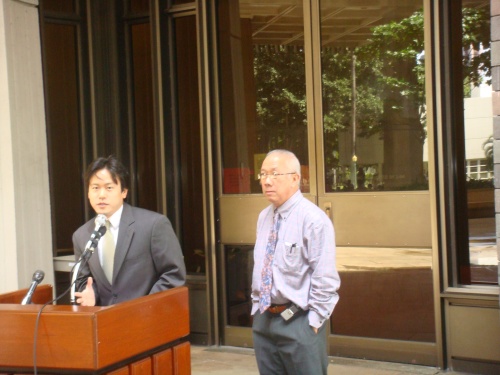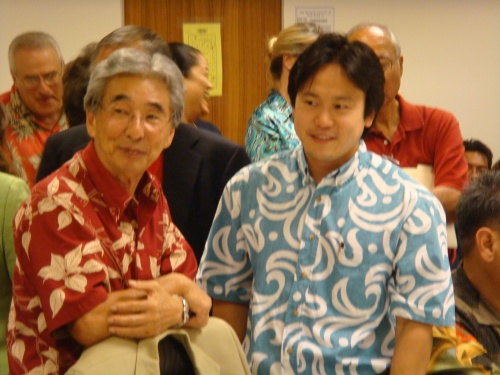Representative Jon Riki Karamatsu
Written Remarks into the House Journal
April 14, 2009; 46th Day
Stand. Comm. Rep. No. 1594 – S.B. 764, S.D.2, H.D. 2, Relating to Real Property
I rise in support of Senate Bill 764, Senate Draft 2, House Draft 2, Relating to Real Property. Small businesses and farms are an essential element in strengthening and diversifying Hawaii’s economy and creating jobs for our people and despite their contribution to Hawaii’s economy, small businesses and farms are at a disadvantage in terms of land ownership. The commercial, industrial, and farm properties that exist within the state’s districts are primarily owned by a few landowners. These landowners control large tracts of land and retain their ownership by means of leases to small businesses and farms, which in turn supply services and products for our community.
The purpose of the first part of this bill is to stabilize Hawaii’s economy by addressing some of the burdensome or vague provisions of existing commercial and industrial leases of certain lands within urban districts by clarifying provisions in long-term commercial and industrial ground leases, without substantial reduction in the economic benefit to the landowners or impact on their ownership of the land, without impairing their lease contracts, and without the taking of any property rights without due process of law.
Senate Bill 764 explains that notwithstanding any other law to the contrary and unless expressly stated to the contrary in the lease, any lease of commercial or industrial leasehold property shall be subject to the following terms and conditions: 1) Whenever a lease existing on July 1, 2009, or entered into thereafter, provides for the renegotiation of the rental amount or other recompense during the term of the lease and the renegotiated rental amount or other recompense is based, according to the terms of the lease, in whole or in part on a fair and reasonable annual rent as of the commencement of the term, that provision shall: (A) Be construed to require that the rent shall be fair and reasonable to both the lessor and the lessee to the lease; and (B) Take into account any and all relevant attendant circumstances relating to the lease, including: (i) Past renegotiation practices and policies throughout the previously renegotiated lease rents; (ii) The uses and intensity of the use of the leased property during the term of the lease approved by the lessor; (iii) The surface and subsurface characteristics of the leased property and the surrounding neighborhood of the leased property on the renegotiated date; and (iv) The gross income generated by the lessee on the renegotiated date.
In the second part of this bill, the purpose is to carry out the mandate of Article XI, section 3, of the Hawaii Constitution to conserve and protect agricultural lands and assure availability of agriculturally suitable lands.
The legislature finds that the land use law was enacted to “preserve and protect land best suited for . . . agricultural purposes and to facilitate sound and economical urban development” (Senate Standing Committee Report Number 580; 1961 Senate Journal). Since that time, however, lands classified by the land study bureau as class A and class B lands, the lands most suited for intensive agricultural use, have declined from three hundred fifty-nine thousand six hundred ninety acres (Class A, one hundred twenty-five thousand one hundred sixty acres; class B, two hundred thirty-four thousand five hundred thirty acres) in 1960 to one hundred seventy-two thousand ninety-four acres (Class A, fifty-six thousand six hundred fifty-three acres; Class B, one hundred fifteen thousand four hundred forty-one acres) in 2007. These agricultural lands are a resource that cannot be replaced once they are lost to development.
The inventory of lands that are suitable for agriculture is essentially fixed. Unlike other agricultural inputs, agricultural lands cannot be manufactured when the demand for them increases. In 1960, the land study bureau estimated that there were nearly three hundred sixty thousand acres of class A and B lands on the six major islands. These were the lands upon which the State depended for profitable, competitive agricultural production. By 2007, the inventory of class A and B lands had declined to slightly more than one hundred seventy-two thousand acres, making it more important than ever to conserve Hawaii’s most productive agricultural lands, especially in counties with a population of over five hundred thousand residents.
Part two of this bill provides that whenever any agreement or document for the lease of private agricultural lands with soil classified by the land study bureau’s detailed land classification as overall (master) productivity rating class A or B for agricultural use in counties with populations of over five hundred thousand provides for the renegotiation of the rental amount and the term of the lease, and the lessee has made improvements or is seeking to make improvements on the land, the renegotiated term of the lease shall include an extension of the lease for a period of not less than seventy-five per cent of the original term of the lease.
Further, the measure requires that for a boundary amendment for agricultural lands with soil classified by the land study bureau’s detailed land classification as overall (master) productivity rating class A or B, no amendment of a land use district boundary shall be approved in counties with a population of over five hundred thousand where: (1) A farming operation as defined in Hawaii Revised Statutes section 165-2 is being conducted on the land; (2) The land is important for agriculture based on the stock of similarly suited lands in the area; (3) The district boundary amendment will harm the productivity or viability of existing agricultural activity in the area; and (4) The district boundary amendment will cause fragmentation of or intrusion of nonagricultural uses into largely intact areas of agricultural lands with soil classified by the land study bureau’s detailed land classification as overall (master) productivity rating class A or B. These requirements will help to protect some of our most valuable and productive agricultural lands. Thank you.









